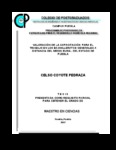| dc.contributor.advisor | Vargas López, Samuel | |
| dc.creator | Coyote Pedraza, Celso | |
| dc.date.accessioned | 2012-09-08T18:44:00Z | |
| dc.date.available | 2012-09-08T18:44:00Z | |
| dc.date.issued | 2007 | es |
| dc.identifier.uri | http://hdl.handle.net/10521/1460 | |
| dc.description | Tesis (Maestría en Ciencias, especialista en Estrategias para el Desarrollo Agrícola Regional).- Colegio de Postgraduados, 2007. | es |
| dc.description.abstract | Con el objetivo de conocer y valorar la percepción y las expectativas que tienen los estudiantes, los padres de familia y los profesores de la capacitación para el trabajo que se imparte en los Bachilleratos Generales a Distancia en la Mixteca Poblana, se realizaron entrevistas a 78 jefes de familia, 84 estudiantes y 15 profesores. De la unidad de producción (UP) se obtuvo información de la familia, situación socioeconómica y disponibilidad de recursos naturales; en los estudiantes y profesores se valoró la capacitación recibida, beneficios generados y propuestas de cambio. Las UP fueron clasificadas como unidades familiares de transición (23 %) y de subsistencia (77 %). El modelo de regresión logística determinó que la valoración alta de la capacitación por los padres de familia se relacionó con la disponibilidad de recursos naturales (p<0.0437) e infraestructura (p<0.0036) y la venta de mano de obra (p<0.0260). En los estudiantes la valoración alta de la capacitación se relacionó con las variables: familiares que migran (p<0.006), mano de obra agropecuaria (p<0.009), rendimiento de maíz (p<0.001), maíz consumido (p<0.002), ingreso por venta de maíz (p<0.001) e ingresos familiares totales (p<0.04). Los profesores valoraron a la capacitación por impulsar el desarrollo de la comunidad (46.7%), permitir el autoempleo del alumno (20%), ayudar al estudiante a obtener una carrera técnica (20%) y por permitir vincular al alumno con el sector productivo (13.3%). En las expectativas para mejorar la educación a distancia, los estudiantes propusieron la capacitación a docentes y la realización de prácticas, y los profesores señalaron que se deben de actualizar programas (20 %), vincular escuela y la comunidad (20 %) y la discusión de los programas de cursos por región socioeconómica (26.7 %)._________The objective of this research was to identify the perceptions and expectation of parents, students and teachers about the training for employment in the Superior Middle Distance Program (EMSAD) from the Mixteca Poblana Region. Seventy eight head of the family, eighty four students and fifteen teachers from the communities of Ahuatlan, Coatzingo, Tlanalapa and Calmeca in the estate of Puebla, were interviewed. It was getting information about family status, economic aspects and natural resources available from householders; about the training received, its personal and social usefulness, as well as the possibility to improve it at school. The agriculture activities of the householder were classified as transitional (23 %) and subsistence (77 %). The householders graded highest the training for employment and their grading was related to amount of natural resource available (p<0.0437), to agriculture building characteristics (p<0.0036) and hand labor sold (p≤0.0260). Students also graded highest the employment training and their grading was associated the emigration (p≤ 0.006), agricultural labor (p≤ 0.009), corn yield (p≤ 0.001), amount of corn eating by the family (p≤ 0.002), income due to corn selling (p≤ 0.001) and family income (p≤0.04). The teachers pointed out that the educational training to improve the community development (46.7%), to increase the possibility to self-employment by former students (20%), to help to former students to be professionals in their study field (20 %) and to involved former students to the productive sector (13.3%). Student’s approaches about the EMSAD were to improve the teaching of teachers and to practical teaching affectivity, while teacher’s approaches were to update the teaching programs (20 %), to link the school to the closer communities (20 %) and to design teaching programs according to the social and economic situation of the Mixteca region (26.7%). | es |
| dc.description.sponsorship | CONACYT | es |
| dc.language.iso | spa | es |
| dc.rights.uri | http://creativecommons.org/licenses/by-nc-nd/4.0 | |
| dc.subject | Valoración de la educación | es |
| dc.subject | Capacitación para el trabajo | es |
| dc.subject | Programa de educación a distancia | es |
| dc.subject.ddc | Maestría | |
| dc.subject.ddc | EDAR | |
| dc.subject.ddc | Estrategias para el Desarrollo Agrícola Regional | |
| dc.title | Valoracion de la capacitación para el trabajo en los bachilleratos generales a distancia del medio rural del estado de Puebla | es |
| dc.type | Tesis | es |
| Tesis.contributor.advisor | Macías López, Antonio | es |
| Tesis.contributor.advisor | Paredes Sánchez, Juan Alberto | es |
| Tesis.contributor.advisor | Hernández Salgado, José Hilario | es |
| Tesis.contributor.advisor | Sánchez Gómez, María de Lourdes. | es |
| Tesis.subject.nal | Economía rural - Puebla (México). | |
| Tesis.subject.nal | Educación a distancia - Puebla (México). | |
| Tesis.subject.nal | Comunidades rurales - Puebla (México). | |
| Tesis.subject.nal | Entorno socioeconómico - Puebla (México). | |
| Tesis.subject.nal | Educación pública - Puebla (México). | |
| dc.subject.ingles | Student’s appraisal | es |
| dc.subject.ingles | Training for employment | es |
| dc.subject.ingles | Distance education program | es |
| dc.type.conacyt | masterThesis | |
| dc.identificator | 6 | |
| dc.contributor.director | VARGAS LOPEZ, SAMUEL; 120266 | |


